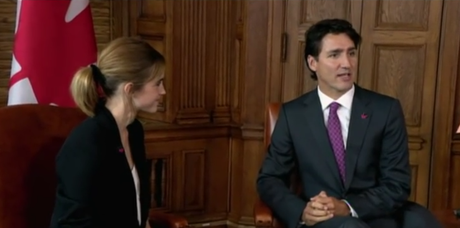
Credit: YouTube
On September 29th, two influential individuals had a very public meeting of the minds: Justin Trudeau, current Prime Minister of Canada, and actor/activist Emma Watson. The two met in Parliament in Ottawa on September 28, 2016, ahead of the One Young World summit, and reportedly discussed their efforts regarding gender equality. But what should have been celebrated as a positive interaction that highlighted the work both of these public, influential figures are doing was interpreted far too cynically by too many — as a ploy for attention rather than a genuine conversation — which adds to an upsetting legacy of the way they have been treated under the spotlight. It also speaks to skepticism to which politicians are often subjected, which undermines their ability to lead with a conscience.
Trudeau has taken many opportunities to stand up for and call out gender inequality. In 2015, he notably elected a 50/50 gender balanced cabinet for the first time in Canadian history. He marched in both Toronto and Vancouver’s Pride Parades and has made his overall respect for people of difference clear — specifically by speaking to Canadians of many different socio, political and economic statuses and becoming a champion for UN Women’s solidarity movement for gender equality, HeforShe.
Yet Trudeau has faced much criticism and has been toted as being a faux feminist — a critique in turn connected to the widespread public commentary that he acts like a liberal whilst his politics are Conservative. Essentially some believe that, appearances aside, Trudeau makes Conservative political decisions while consistently appearing liberal so as to gain favor with socially liberal Canadians. But to assume his activism is solely skin deep seems like a rather harsh, unwarranted judgment that discounts his integrity. And I think it can fairly be argued that certain fiduciary decisions the Canadian government has made — like exporting oil and natural gas, for example — were made as an effort to keep our nation’s economic stability in the context of an increasingly globalized world of trade and free-market mentality. While such political decisions may not align with the politics of certain liberal groups, such decisions should not necessarily negate their other displays of goodwill nor discredit the basic integrity of any person.
As for Emma Watson? — an international celebrity with millions to her name — she could easily remain content modeling for fashion brands, starring in movies, or living in a beautiful English castle. But despite these alluring opportunities, she has chosen to focus on raising the profile of a social problem that knows no geographical bounds: Gender inequality and its inherent issues, such as sexualized violence. But, perhaps predictably, Watson has also faced criticism for her decision to do so. Many articles have made statements along the lines that Watson’s too entitled to speak to issues of women’s inequality, due to her elevated social and economic status. Some see her as speaking out of line by discussing and advocating for issues that don’t affect her.
Indeed, Watson is extremely privileged in that she is white, cisgender, wealthy, and able-bodied. But while Watson likely knew she’d get plenty of negative criticism for becoming a Global Goodwill Ambassador for UN Women, she has chosen to publicly fight for gender equality anyway, joining a long legacy of feminist crusaders who have historically received (and continue to receive) heavy criticism and face resistance. What’s more, Watson candidly addressed this criticism on a number of occasions. For example, she has directly admitted that she’s privileged, stating that she chooses to be an activist because she cares about these issues and wants to help and because it’s the right thing to do.
“You might be thinking who is this Harry Potter girl?” Watson said in her debut speech as Goodwill Ambassador in front of the United Nations General Assembly in 2014. “And what is she doing up on stage at the UN? It’s a good question and, trust me, I have been asking myself the same thing. I don’t know if I am qualified to be here. All I know is that I care about this problem. And I want to make it better.”
Later in that speech, Watson freely and openly expressed how issues of gender inequality have personally affected her. For example she expressed that she has been overtly and continually sexualized by certain aspects of the media from a very early age. She has also mentioned in other interviews that she has been stalked and “slapped on the arse when walking out of a room,” and explained how this is not unique to her, but that it has happened to friends of hers. In doing so, she has demonstrated that we must think outside of a black and white analysis of privilege. Just because Watson is rich and famous, and therefore has greater personal agency and privileges than others, doesn’t mean she hasn’t experienced issues of inequality that women face every day. Consider this: Her position of privilege may in fact be an advantage. She has an incredible platform from which to spread this message and raise awareness.
Ultimately, Watson and Trudeau have both done much to convincingly demonstrate that they are deeply compassionate people who are vitally socially aware, suited with an amour of confidence and determination, and fueled by an evident burning desire to use their platforms as tools for positive change. Rather than cynically assume they must have ulterior motives or are ill-suited to create change, and to critique them, perhaps we’d be better off acknowledging and appreciating their displays integrity — qualities that are quite rare among celebrities and politicians alike — in the hopes that more public figures will follow in their paths.

